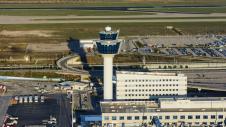A dispute that has arisen in recent months between OTE and PPC after George Stassis' plan to enter telecommunications has reached the Prime Minister’s office.
The management of Michalis Tsamaz at OTE considered it almost certain that the company would be able to monopolize the fiber optic network, just like it monopolizes today the "last mile" in telecommunications, ie the copper network that connects the cabin with the subscriber's house.
Limited investments by OTE's competitors in optical fibers allowed OTE management to believe that it would prevail in the era of optical fibers. Just as its competitors today pay fees to reach the final consumer through the copper network, so too will they pay in the future to reach them through fiber optics.
Until the announcements of the head of PPC, G. Stassis, came, that is, and the party was ruined.
PPC, as Stassis said in the last teleconference with the analysts, wants to quickly and cheaply develop a fiber optic network leading to houses, not to sell telecommunication services itself. It will lease it to telecommunications groups so that they can provide services. In other words, PPC will do what OTE wants to have a monopoly on!
The copper that is ... gold
Today, the most profitable part of OTE is its ageing copper network, because the group collects money from millions of lines that customers have, e.g. of Vodafone Greece, Wind Hellas and Nova. The management of the group is in a hurry to develop the fiber optic network and, as it announced on the occasion of its half-year results. By the end of the year it will have reached 550,000 households. OTE, however, has significant costs for the development of the fiber optic network. Today it is digging in areas of Attica and the rest of Greece that it considers commercially attractive and has included in the company’s investment plan.
On the contrary, PPC can utilize the existing infrastructure of HEDNO, ie the electricity poles, to reach the fiber optic network to every house in the country at a lower cost and at faster speed. Stassis insists on this plan because, as the former head of ENEL Romania, he knows first hand how this country managed to have one of the cheapest and fastest internet connections in Europe: Utilize the electricity poles to pass fiber optics with low cost and in a short time.
Government concerns
Some, even officials within the government, argue that the country does not need a second access network and that investments by OTE and other providers, combined with government subsidies such as the Ultra Fast Broadband project, are sufficient. In other words, they believe that the optical fibers will reach their target sufficiently. This indicates that there is no need to spend hundreds of millions from PPC to offer a competitive access point to Greek households.
It seems, however, that PPC does not have the same opinion. But some in the government also see an investment gap in fiber optics and believe that there is room for PPC’s involvement.
One of the arguments of those who wanted to block Stassis’ plans was neighboring Italy. The previous government wanted to merge the two companies that control the fiber-optic home-based infrastructure: Open Fiber, founded by ENEL (Australian Macquarie recently acquired 40%), and FiberCop, which controls the infrastructure in " last mile "of the former Telecom Italia monopoly. But the current government of Mario Draghi has overturned the plan and says the market will answer whether Italy needs one or two access networks. Coincidentally, the minister in charge is Vittorio Kolao, the former CEO of the British group Vodafone.








